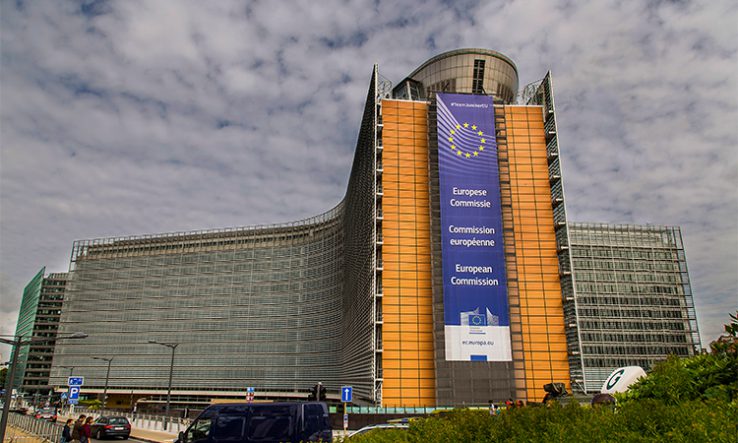
Image: Ivan Kacarov, Shutterstock
Many contentious UK policies seemingly in line with EU advice
Advice provided to the European Union by its dedicated Covid-19 expert group appears to indirectly lend support to many of the most controversial actions taken by the UK government, Research Professional News has found.
Some of the most contentious early statements made by UK scientific advisers, such as on pursuing herd immunity and dropping community testing, were mirrored by discussions and recommendations by the EU expert advisers throughout the course of the pandemic.
It is unclear to what extent, if any, the groups have influenced each other, though the EU advice sometimes lagged behind the UK’s.
The EU panel, which advises the European Commission on Covid-19 mitigation policies, is comprised of seven individuals drawn from across Europe as well as representatives of bodies including the European Centre for Disease Prevention and Control and the European Medicines Agency.
It is co-chaired by the EC president and health commissioner, with no national politicians participating in its meetings.
Members include Arnaud Fontanet, who launched the emerging diseases epidemiology unit at France’s Institut Pasteur and has worked on the SARS and MERS coronaviruses; Marion Koopmans, head of the department of viral sciences at Erasmus MC Rotterdam and director of its World Health Organization collaborating centre on emerging infectious diseases; and Peter Piot, director of the London School of Hygiene and Tropical Medicine and a world-renowned virologist.
The panel has been holding talks every few days since 12 March, and reports of those meetings, which have received little public attention, show that it has discussed many of the issues over which the UK government and its science advisers have drawn fire from some academics, opposition politicians and the media in recent weeks.
Testing
For example, on 12 March the UK’s prime minister Boris Johnson alongside chief medical officer Chris Whitty and chief scientific adviser Patrick Vallance announced that the UK had shifted from trying to contain the spread of the disease to trying to delay its peak. They also announced that the UK would no longer attempt to confirm that everyone with symptoms had the disease but would instead prioritise testing people in hospitals.
The move “alarmed many public health experts”, according to Helen Ward, a professor of public health at Imperial College London, writing in the Guardian on 15 April.
But on the same day, the EU panel held its first discussion and appears to have reached similar conclusions: “It is no longer possible to stop the pandemic, only to delay it.”
On 15 March after another discussion, the EU group reportedly advised: “It must be made clear that not everyone needs to be tested…laboratories are either already or will soon be under pressure” and suggested focusing on people in hospitals and vulnerable situations.
This is related to another area in which the UK government has been criticised: its volume of testing, which has lagged behind that of countries such as Germany.
But on 25 March, the same day Whitty said testing was a global problem, the EU advisers also “stressed the difficulties in greatly extending testing due to limited testing reagents”, and said it was “difficult” to the assess quality and effectiveness of new tests.
Herd immunity
On 12 March, Vallance controversially said “It’s not possible to stop everybody getting it [Covid-19], and it’s also actually not desirable because you want some immunity in the population.” The following day Vallance told the BBC: “Our aim is to try and reduce the peak, broaden the peak, not suppress it completely; also, because the vast majority of people get a mild illness, to build up some kind of herd immunity…”
But on 14 March, a group of hundreds of scientists from a broad range of disciplines signed an open letter worrying that a ‘herd immunity’ strategy would “put [the] NHS at an even stronger level of stress, risking many more lives than necessary”.
The health secretary Matt Hancock then said that herd immunity was not part of the government plan.
A few days later, though, on 18 March, the EU panel advised: “It is important to consider the gradual development of population immunity as part of a package of measures that help mitigate the epidemic”.
And on 30 March they discussed criteria to consider moving towards a gradual lift of lockdown measures, mentioning “acquired immunity” as an “obvious candidate”.
Borders
Another area of criticism has been the UK government’s decision not to close its borders or test entrants, in contrast to many countries around the world.
On this subject, on 15 March the EU advisers “explained the limitations of border controls [as] health screening has limited success in detecting affected people due to the long incubation period and the possibility of asymptomatic carriers”.
Masks
Finally, the UK government has also been criticised for not requiring the public to wear masks, saying that the evidence is as-yet unclear, after several countries made wearing masks a requirement in certain circumstances.
Here the EU advisers, in their most recent published report from 5 April, “agreed that no new evidence indicates the effectiveness of medical level masks for the general public” but “suggested that community (home-made) masks could be useful barriers…in certain circumstances”.